Operation Torch. How the Allies took over French North Africa
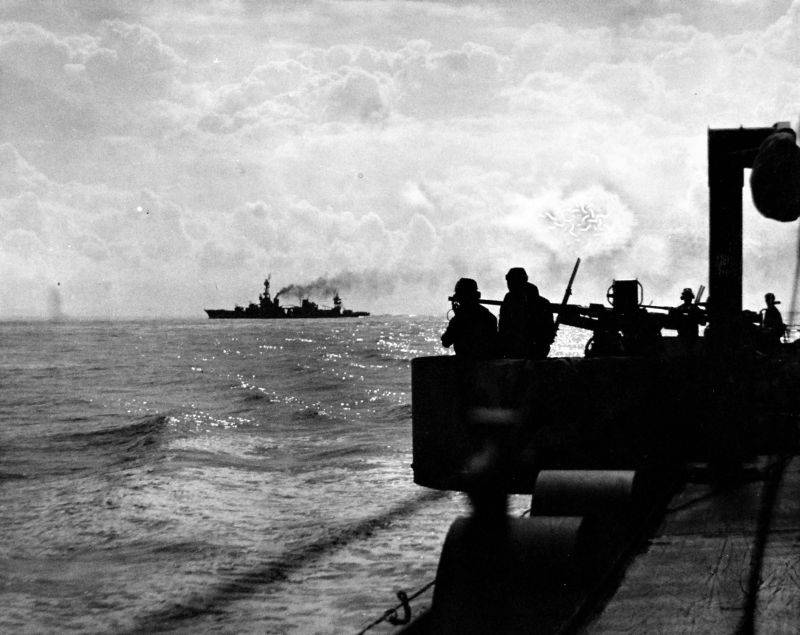
American heavy cruiser "Augusta" under fire from the French battleship "Jean Bar" in the battle near Casablanca, during Operation Torch
Allied plans
The Anglo-American command sought to make full use of Germany's deteriorating position on the Russian front in order to defeat the enemy in North Africa and achieve dominance in the Mediterranean basin. Britain and the United States planned to establish complete control over North Africa, the colonies of Italy and France, strengthening their resource base and, accordingly, worsening the position of the Axis countries.
Also, North Africa with the surrounding areas was a strategic springboard for the future invasion of Italy and the countries of South-Eastern Europe. At the same time, it became possible to fully use the sea communications going from the Atlantic to the Indian Ocean through the Suez Canal, which reduced time and material costs.
They also took into account the fact that the enemy could not divert large forces to this theater, connected with the war with the Russians. That is, the risks of getting a strong rebuff and incurring heavy losses were minimal. The Allies hoped that the French troops in North Africa, loyal to the Vichy regime, would not put up serious resistance.
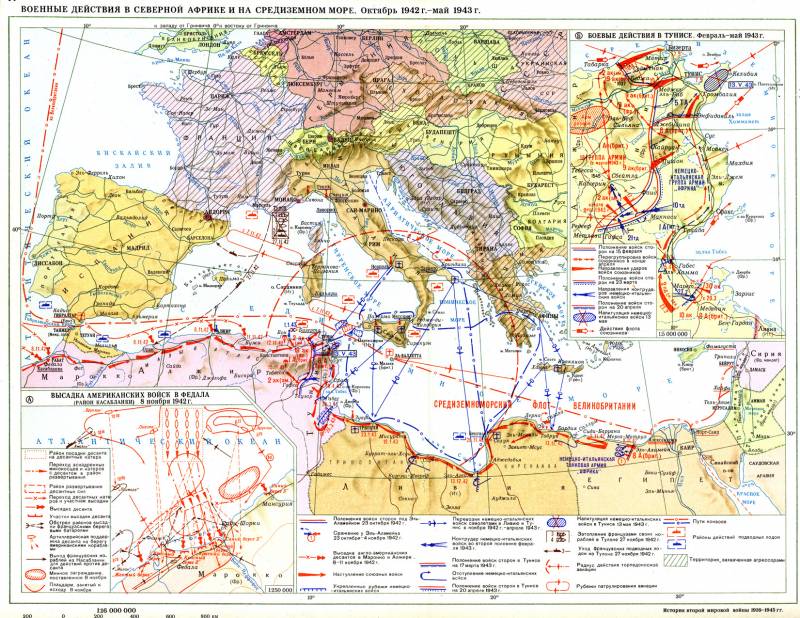
First, the Allies planned to defeat Rommel's army in Egypt, then to invade Morocco and Algeria. During the operation "Torch" ("Torch"), it was supposed to seize bridgeheads in the areas of the cities of Oran, Algiers, Tunisia and Casablanca. Then establish control over all of French North Africa - Algeria, Tunisia and Morocco. If necessary, they were going to occupy Spanish Morocco. The capture of the French colonies in Africa was supposed to lead to a weakening of the collaborationist regime in southern France and to strengthen the base of the French Resistance ("Fighting France"), led by de Gaulle.
At the same time, Britain and the United States were going to intensify the actions of their navies and air forces in the Mediterranean in order to achieve complete dominance here, create a favorable situation for troops in North Africa and prepare for future operations in southern Europe.
Thus, the United States and Britain adhered to the previous strategy of dragging out decisive action against the Axis countries while Germany concentrated all its efforts in the fight against Russia. At the same time, the Americans and the British tried to grab as many tidbits as possible for the future redistribution of the world in their favor.

"Torch"
British 8th Army victory in Egypt (How Montgomery's 8th Army stormed Rommel's positions at El Alamein) radically changed the strategic situation in North Africa in favor of the allies. Aviation and the fleet of the allies were able to use the airfields and ports of Libya.
The plan of the landing operation provided for the landing of large forces in the areas of the ports of North Africa. General Dwight Eisenhower was appointed to command the operation, having located his headquarters in Gibraltar. Andrew Cunningham was appointed naval commander of the Allied Expeditionary Force; his second-in-command, Vice Admiral Bertram Ramsey, was tasked with planning the landing.
There were up to 6 divisions in the first echelon. Several airborne battalions were intended to capture airfields and important points on the coast. As part of fleet, providing the transfer and landing of troops, there were up to 450 ships and vessels.
Three operational formations of the fleet were created: Western, Central and Eastern under the command of the American Admiral G. Hewitt, the British Commodore T. Troubridge and Admiral G. Barrow. The western formation of the fleet ensured the passage of troops from the United States and their landing in the Casablanca region (35 thousand Americans), the Central one - from Britain to the Oran region (39 thousand Americans) and the Eastern one - from the British Isles to the Algiers region (23 thousand British and 10 thousand Americans). The passage by sea and the landing were covered by the US and British navies.
For aviation support of the operation, two Air Force commands were created - Western (Casablanca and Oran) and Eastern (Algeria).
The Americans were able to establish contact with the commander of the Vichy forces in Algeria, General Charles Mast, and win over the army general of the Vichy regime, Henri Giraud. The French commanders promised not to oppose the landing. Therefore, the significant Vichy forces in North Africa - up to 200 thousand people, up to 500 aircraft and the Mediterranean Fleet (5 battleships, including one unfinished, 12 cruisers, about 40 destroyers, more than 20 submarines and other small ships), could not put up serious resistance to the allies .
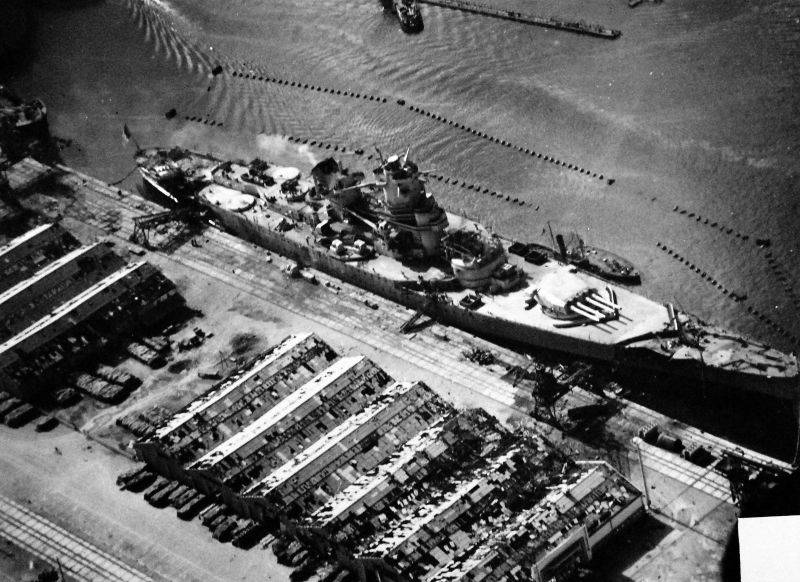
Damaged French battleship "Jean Bar" at the pier, after the battle at Casablanca. The battleship accepted the battle with the ships of the American squadron, being unfinished. As a result of the damage received, the ship sat down on the ground astern. In the area of the stern on the starboard side, traces of serious destruction are visible from a 454-kg bomb that hit a place previously damaged by a bomb and a 406-mm projectile
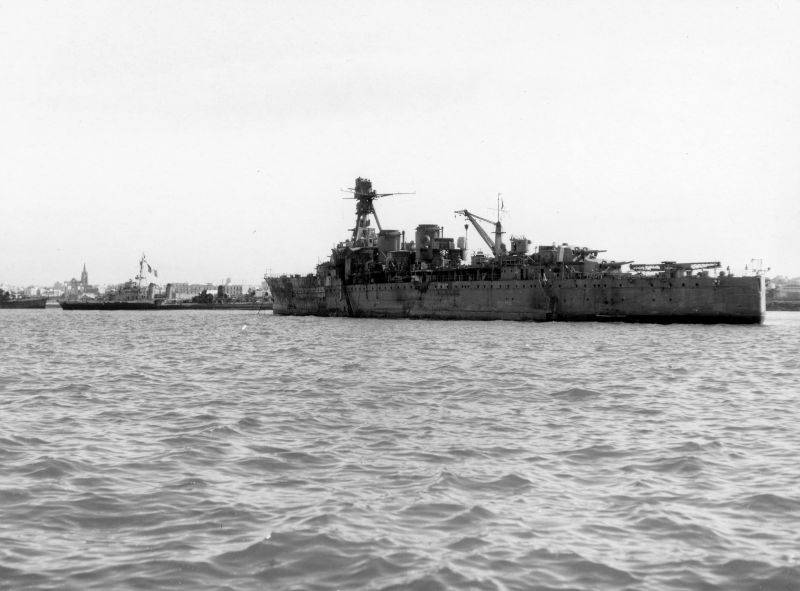
Damaged light French cruiser "Primoge" on the shallows of the port of Casablanca. On November 8, 1942, the Primoge, despite repairs being carried out on it, went to sea accompanied by five destroyers and entered into battle with the American formation. The clash turned out to be fleeting due to the overwhelming superiority of American forces. The cruiser was hit by shells from the American cruiser Brooklyn, as well as hit by aerial bombs from SBD Downless dive bombers operating from the Ranger aircraft carrier. As a result, the cruiser was heavily damaged and washed ashore, after which she burned all night. 45 crew members were killed, including the commander - Captain 1st Rank Mercier, more than 200 people were injured
Allied landings in North Africa
On October 24, 1942, the landing transports left the ports of America, a few days later - from the ports of the British Isles. There was no opposition from the air forces and fleets of Italy and Germany. The Allies managed to keep the time and place of the landing secret. The Italians informed the Germans that large naval forces were moving through Gibraltar into the Mediterranean and further east. The Germans decided that the enemy was preparing an amphibious landing in Libya, or in Sicily, Sardinia and southern Italy. The option of invading French North Africa was considered last.
On the night of November 8, 1942, the landing began. The landing force was ordered not to fire unless they were fired upon. At 10 o'clock in the morning, the address of the American President Roosevelt was broadcast on the radio. He promised not to seize French possessions and called for cooperation.
In Morocco, the Americans landed north and south of Casablanca. The main difficulties were associated with weather conditions and shortcomings in navigation support. The French fleet, air force and garrisons offered minimal resistance at first. The landing started late. At dawn, the French increased resistance: coastal batteries and ships opened fire, landing facilities and bridgeheads were attacked by ships and aircraft.
Allied naval artillery and aircraft from aircraft carriers responded. By the end of the day, more than 7,5 thousand people were landed on the shore. At the same time, the paratroopers captured two large airfields in Morocco. The French stopped resisting. Casablanca was surrounded and surrendered by 10 November.
The Americans landed in the area of Oran to the west and east of the city. The French resisted. In particular, they repelled an attack by British ships and an attempt to capture Oran from the sea. Two patrol ships and most of the paratroopers on them were lost. The Allies lost over 600 killed, wounded and missing. However, on November 10, the Oran garrison capitulated.
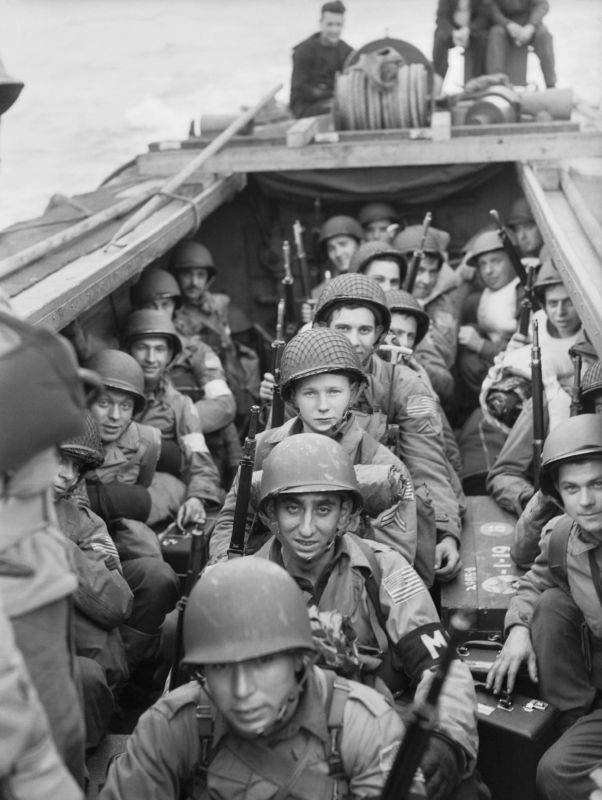
US paratroopers in a landing craft en route to the Oran landings
Algeria was captured without enemy resistance. Here, on the night of November 8, the French Resistance forces attempted to carry out a coup and captured a number of important objects. While the Vichy fought them, the allies made a landing. Coastal batteries were previously disabled by the rebels. Already on the 8th, the Allies occupied Algiers. On November 10, landing transports were sent to capture the port of Buzhi, its garrison surrendered without a fight on the 11th.
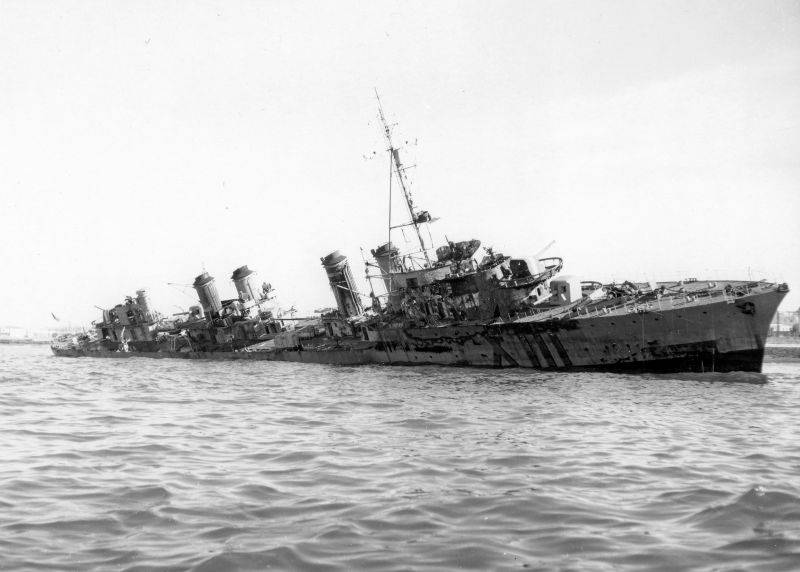
Damaged French destroyer "Milan" on the shallows of the port of Casablanca. On November 8, 1942, the destroyer received numerous damage and washed ashore.
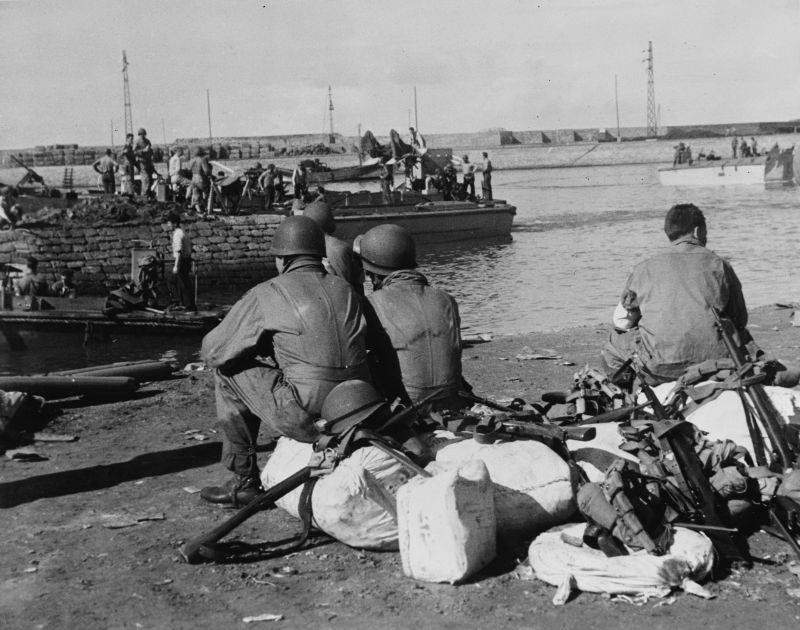
American soldiers rest on a pier after landing in the harbor of the port of Fedala in Morocco.
Agreement
In general, Vichy resistance was minimal. The French lost more than 3,3 thousand killed and wounded, the Allies - 3,6 thousand people. With the determined resistance of the French, the allies would have faced big problems and the losses were very serious.
On November 10, 1942, the commander-in-chief of the French forces, Admiral Francois Darlan and General Henri Giraud, negotiated with the Allies and ordered the French land, sea and air forces to cease resistance and strict neutrality. On November 22, an agreement was concluded with the French. The allied command received greater rights, but the administration remained French. Darlan became High Commissioner for North Africa, Giraud led the French troops who joined the Allies.
Anglo-American troops were able to safely land and march east. In mid-November 1942, having occupied Morocco and Algeria, the Allies entered the territory of Tunisia. By the beginning of December 1942, the Allies had already landed more than 250 thousand people.
The German command tried to preempt the enemy and seize a bridgehead in Tunisia. In accordance with the directive of November 10, the transfer of troops to Tunisia began by sea and air. From France and Italy were transferred tank and infantry divisions that formed Task Force Nering. In early December, this group was transformed into the 5th Panzer Army. The army received the task, together with Rommel's troops retreating from Libya, to keep Tunisia.
On November 17, the Nering group entered into battle with the Anglo-American troops west of Bizerte. In the second half of November, the allied troops reached the western part of Tunisia, on the distant approaches to the ports of Tunis and Bizerte. Further advance was stopped by the enemy. The allied command began to increase the grouping, by the end of January 1943 - more than 400 thousand plus up to 200 thousand French.
In response to the Allied invasion of French North Africa, German troops occupied Southern France. The French sailors scuttled their fleet so that the Germans would not get it. This finally changed the balance of the Navy in the Mediterranean in favor of the Allies.
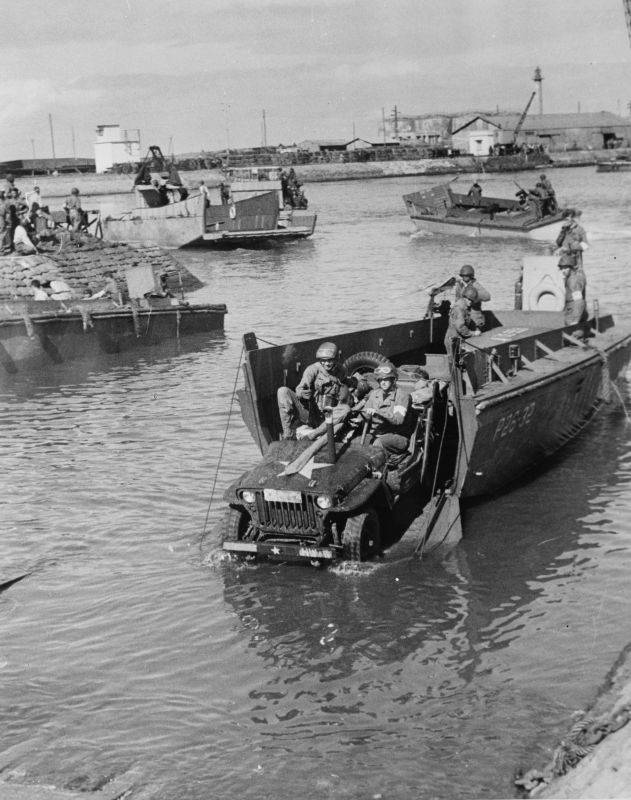
A US Army Jeep "Willis" exits a landing craft in the harbor of Fedala, Morocco.
Information